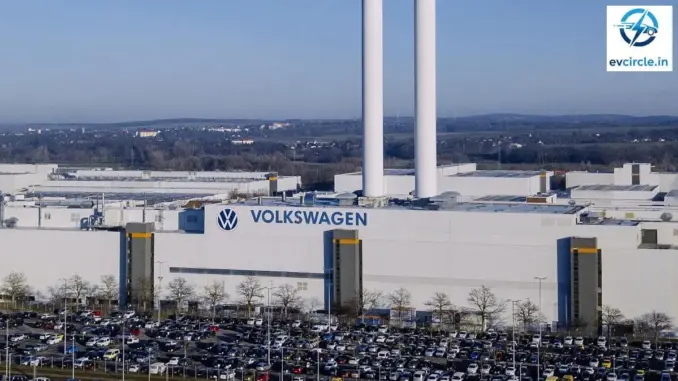
Volkswagen is reducing output of its electric vehicles in Europe as demand has not increased as quickly as anticipated.
Spokespeople for Volkswagen’s plants in Germany have verified forthcoming production pauses.
Production at Zwickau will be halted for a week from October 6, reportedly because of weak demand for the Audi Q4 e-tron in the US owing to tariffs. Zwickau also manufactures the Volkswagen ID.4 and ID.5 SUVs, and the closely related ID.3 and Cupra Born hatchbacks.
The lines will also cease at the Dresden ‘Transparent Factory’ during the first week of the October autumn holidays, with a spokesperson explaining the pause is because “the company is adjusting its production schedule to the current market situation”.
Originally constructed as the company’s showcase plant to build the Phaeton, Volkswagen’s ill-fated bid to move into S-Class territory, the Transparent Factory now builds the Volkswagen ID.3.
The Emden plant, which produces the ID.4 SUV and the ID.7 sedan and wagon, has reduced employee hours and is planning to shut for several days.
Volkswagen Commercial’s plant in Hanover will also suspend production during the October autumn holidays, impacting the ‘T7’ Multivan and ID. Buzz.
Figures from Dataforce show Volkswagen (16,105) was the top brand in the EV sector across Europe in August, with sales up 45 per cent compared with the same period last year.
It edged out second-placed Tesla (14,345), which fell 23 per cent, and BMW (12,546) in third, up 7 per cent.
The rest of the top ten includes Skoda (11,223), Audi (9,564), Hyundai (8,229), Mercedes‑Benz (8,207), Renault (7,501), Ford (6,619), and BYD (6,465). All of these brands, aside from Mercedes‑Benz, posted large gains of between 54 and 123 per cent year-on-year.
While Volkswagen was number one overall, the Tesla Model Y (84,314) remains the best-selling EV model across Europe this year. Although it is down a worrying 34.0 per cent, it still sits well ahead of the Volkswagen ID.4 (51,380), up 33.6 per cent.
The Tesla Model 3 (50,237) rounds out the 2025 podium despite a 29.0 per cent decline.
The remainder of the top ten comprises the Volkswagen ID.3 (49,275), Skoda Elroq (48,776), Volkswagen ID.7 (47,501), Kia EV3 (45,119), Renault 5 E‑Tech (43,738), BMW iX1 (43,128), and Skoda Enyaq (41,970), all of which rose at least 26.6 per cent compared with this time last year.
Dataforce’s figures indicate the overall EV market in Europe grew 26 per cent in August compared with the same period in 2024.
Despite the encouraging sales figures, Volkswagen’s dedicated EV plants are operating well below capacity as demand for electric vehicles has not accelerated at the pace most manufacturers expected and planned for.
This has forced many manufacturers to curtail EV production plans and approve the development of new generations of petrol and plug‑in hybrid models.
Recent reversals include Porsche’s decision to add petrol engines to the new Boxster, Bentley approving a new non-electric generation of the Flying Spur and Continental, and Volvo giving the green light to a third-generation XC90.
Tech enthusiast and researcher passionate about innovations shaping the future of mobility.
Leave a Reply